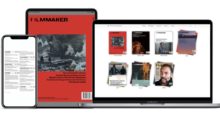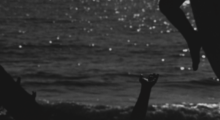6296 Results for “Open ”
-
“In Movies, Comedy and Tragedy Are All the Same”: Jean-Luc Godard Interviewed by Hal Hartley

In Spring of 1994, as Filmmaker began its third year of publication, we received a call: would we be interested in interviewing Jean-Luc Godard? Yes, we excitedly said, and when Hal Hartley agreed to be the interviewer, and the interview was a go, we made the film our cover. (In Filmmaker’s history, it’s sandwiched between Rose Troche’s Go Fish and Rick Linklater’s Before Sunrise.) Rereading the interview today, I’m struck — although I shouldn’t be! — by the prescience of Godard’s musings on the future histories of cinema, the ways that it will be mediated by technology and its changing […]
by Scott Macaulay on Sep 13, 2022 -
19 Months from Conception to Completion: Daniel Goldhaber on How to Blow Up a Pipeline

Daniel Goldhaber’s second feature, How to Blow Up a Pipeline, takes its title and broader inspiration from Andreas Malm’s non-fiction manifesto, published by Verso. Malm’s book is heavy on the language of comrades and cadres, an exhortation to ecoterrorism to the already sympathetically inclined—and, as a friend pointed out, it’d be more accurately titled Why to Blow Up a Pipeline, as instructions aren’t provided. While Goldhaber’s version of How to Blow Up a Pipeline isn’t a manual as such, its commitment to depicting the means by which one might achieve its title goes much further than most. Eight protagonists from all over the country […]
by Vadim Rizov on Sep 12, 2022 -
Filmmaker Moves To Exact Editions for Digital Editions and Archive


Filmmaker is proud to announce that we have moved our quarterly digital edition and archive going back to 2005 to Exact Editions, a London-based company that specializes in digitizing content, selling subscriptions and providing streaming solutions across web, iOS and Android platforms. Our digital edition, which replicates our print edition, is now available to read via Exact Editions across browsers and mobile devices, the latter through a browser or the company’s Exactly app, found in the App and Google Play stores. As a long-time reader of other publications using Exact Editions, I’ve admired the company’s elegant, easy-to-use platform. Issues download quickly, can […]
by Scott Macaulay on Sep 12, 2022 -
“My Social Location as a Member of a Fraternity Makes My Voice a Credible One”: Byron Hurt on His PBS Independent Lens Doc Hazing


As someone who never understood (okay, downright loathed) the conformist culture of so-called Greek-letter organizations, I didn’t bother to catch Byron Hurt’s (Hip-Hop: Beyond Beats and Rhymes, Soul Food Junkies) latest doc Hazing when it premiered at the Tribeca Film Festival back in the spring. But fortunately, the film—which takes a deep historical, as well as personal, dive into what Wikipedia defines as “any activity expected of someone in joining or participating in a group that humiliates, degrades, abuses, or endangers them regardless of a person’s willingness to participate”—will now be launching the new season of PBS’s Independent Lens, which […]
by Lauren Wissot on Sep 12, 2022 -
TIFF 2022: No Bears, La Pupille


I got out of a jam-packed P&I screening of Jafar Panahi’s No Bears literally two minutes after the Venice Film Festival announced a special jury prize for the film. It’s probably not overly cynical to attribute at least part of both my screening’s high attendance and the festival’s award to the sad news that the director is back in jail—his status as a high-profile Iranian dissident is inextricable from his work since 2011 when, under house arrest and banned from making movies, he started making features with him front and center as the lead protagonist. That on-screen character is by now […]
by Vadim Rizov on Sep 10, 2022 -
TIFF 2022: Other People’s Children, The Inspection


It seemed fitting to enter Toronto by a new route for my first in-person TIFF in three years. Rather than going straight from the airport to the downtown core where the festival unfolds, I took a streetcar further afield to one end of the line, Bathurst Station. The Ed and Anne Mirvish Parkette is just outside, with a plaque dating itself to 2008 that gives a mini-bio of the couple (“Humanitarians, Retail Innovators, Arts Advocates”). A few meters over, a conspicuously newer plaque memorializes Beverly Mascoll as “a community advocate and the founder of the Mascoll Beauty Supply Ltd., a […]
by Vadim Rizov on Sep 9, 2022 -
14 Films We’re Recommending You See at the 2022 Toronto International Film Festival



The Toronto Film Festival is underway, the first purely in-person edition since before the COVID-19 pandemic. There are high profile premieres, including Ryan Johnson’s Knives Out sequel, Glass Onion, a number of films traveling on their awards march from Telluride and/or Venice (Florian Zeller’s The Son, Laura Poitras’s All the Beauty and the Bloodshed), as well as smaller acquisition titles that are always in danger of being overlooked amidst the galas. Below are a number of films, most but not all TIFF premieres, that we’re recommending you check out, whether that recommendation is based on pre-screening or just our knowledge […]
by Scott Macaulay on Sep 9, 2022 -
Duration and Velocity: An Interview with Larry Gottheim


Despite making decades of fascinating film work and playing a pivotal role at Binghamton by founding the film department and bringing Ken Jacobs onboard, Larry Gottheim remains an under-celebrated figure in the American avant-garde. With Fog Line (1970)—an 11 minute single-take of fog slowly rising in a meadow, trees asymmetrically clustered, framed by telephone wire—he found a semblance of universal acclaim in the underground. The “first period” of Gottheim’s work (of which Fog Line is a crucial part) takes an approach largely inspired by the stoic film observations of Andy Warhol, a rubric of silence and static framing which trains […]
by Ruairí McCann and Maximilien Luc Proctor on Sep 6, 2022 -
“I Believe Her Experience of Love Was a Brutal One”: Director Eva Vitija on Her Patricia Highsmith Doc, Loving Highsmith


With their pronounced and callous violence, their serpentine studies of obsession, delusion, and identity, Patricia Highsmith’s hypergraphic body of work has by now become as much a part of the culture of literary fiction and cinema as that of her lionized male counterparts. But where the personas of Hammett and Chandler have been crafted into legend, the Fort Worth-born Highsmith has stayed a cipher. While in recent years a pair of biographies and the release of her excerpted private diaries have let some light into the picture, Highsmith’s peripatetic nature remains elusive and secretive. Expatriated from the States and then […]
by Evan Louison on Sep 2, 2022 -
Venice Film Festival 2022: TÁR


Todd Field’s TÁR simulates ethical complexity to “call into question” cancel culture, which—no matter what Gina Carano, Peter Vack et al. have to say about it—is not an unprecedentedly bold or unthinkable move; millions of Americans are waiting to nod in vociferous agreement. The titular Lydia Tár (Cate Blanchett) first speaks at the New Yorker Festival, in onstage conversation with the magazine’s Adam Gopnik as himself. This prolonged opening (somewhere around 15 minutes) provides an excuse for a lot of expository background: Tár is an EGOT honoree, a revered modern conductor, a lesbian who’s also the first woman appointed to lead a […]
by Vadim Rizov on Sep 1, 2022

